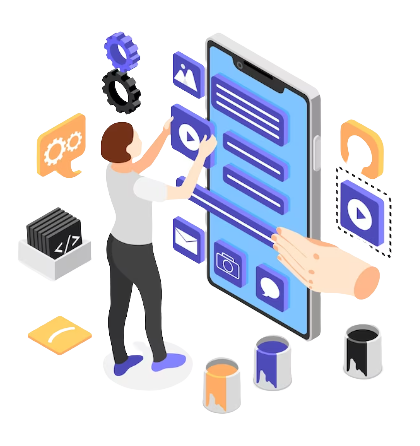Cross-platform mobile app development is the process of building mobile applications that can run on multiple platforms, such as iOS and Android, using a single codebase. Rather than building separate apps for each platform, developers can use frameworks and tools that allow them to write code once and deploy it to multiple platforms.
As the use of mobile devices continues to grow, businesses are seeking ways to reach their audience across multiple platforms. Cross-platform mobile app development has emerged as a popular solution. It allows businesses to create apps that can be used on both iOS and Android devices. While cross-platform development has its benefits, it also presents several challenges that must be considered.
What is Cross-Platform Mobile App Development?
Cross-platform mobile app development is the process of building mobile applications that can run on multiple platforms, such as iOS and Android, using a single codebase. Rather than building separate apps for each platform, developers can use frameworks and tools that allow them to write code once and deploy it to multiple platforms.

Benefits of Cross-Platform Mobile App Development
-
Time and Cost Efficiency
One of the primary benefits is the ability to save time and reduce costs. Building separate apps for different platforms can be a time-consuming and expensive process. Also, it requires hiring separate development teams and writing code for each platform. With cross-platform development, developers can write code once and deploy it to multiple platforms, reducing development time and costs.
-
Consistency Across Platforms
Cross-platform development also allows businesses to ensure a consistent user experience across different platforms. By using a single codebase, developers can ensure that the app looks and functions the same way on all platforms. This can be especially important for businesses that want to maintain brand consistency and provide a seamless user experience.
-
Wider Audience Reach
By creating an app that can be used on both iOS and Android devices, businesses can reach a wider audience. This can be especially important for businesses that operate in multiple regions or countries, where different devices may be more popular. By offering an app that can be used on multiple platforms, businesses can ensure that they are reaching the maximum number of potential users.
Challenges of Cross-Platform Mobile App Development
-
Performance Issues
One of the biggest challenges is ensuring that the app performs well on all platforms. Because cross-platform apps are built using a single codebase, they may not always take advantage of the specific features and capabilities of each platform. This can result in slower performance or less functionality on some platforms.
-
Compatibility Issues
Another challenge of cross-platform development is ensuring compatibility across different devices and platforms. Different devices and operating systems may have different requirements. So developers must ensure that the app is compatible with all of them. This can be especially challenging as new devices and operating systems are released.
-
Limited Access to Native Features
Cross-platform development may also limit access to certain native features of each platform, such as a camera or GPS functionality. While some tools and frameworks allow developers to access these features, they may not always work as well as native features.
Best Practices for Cross-Platform Mobile App Development
-
Choose the Right Tools and Frameworks
To ensure the success of a cross-platform mobile app development project, it’s essential to choose the right tools and frameworks. Developers should research and evaluate different options to determine which will work best for their project. Factors to consider include the project requirements, the development team’s skills and experience, and the target audience.
-
Design for Cross-Platform Compatibility
To ensure that the app works well on all platforms, developers should design with cross-platform compatibility in mind. This includes using design elements that work well on both iOS and Android devices and ensuring that the app functions the same way on all platforms.
-
Test Thoroughly
Thorough testing is essential for ensuring that a cross-platform mobile app performs well on all platforms. Developers should test the app on multiple devices and operating systems to identify and address any compatibility or performance issues.
Conclusion
Cross-platform mobile app development can offer significant benefits to businesses, including time and cost savings, wider reach, and increased efficiency. However, it is important to carefully consider the specific needs and requirements of each project before deciding to use cross-platform development. By following best practices such as utilizing native features, selecting the right framework, and testing thoroughly, businesses can mitigate the challenges and ensure a successful cross-platform mobile app development process. In today’s fast-paced digital world, it is becoming increasingly popular and is likely to continue to evolve and improve in the coming years. By embracing this technology, businesses can stay ahead of the curve and provide their customers with innovative and seamless mobile experiences.
Check out Tanbits, Our company offers cross-platform mobile app development services that can help businesses save time and costs while reaching a wider audience and increasing efficiency. We carefully consider each project’s needs and requirements and follow best practices such as utilizing native features, selecting the right framework, and testing thoroughly to ensure a successful development process. By embracing cross-platform mobile app development, businesses can provide innovative and seamless mobile experiences to their customers and stay ahead of the competition in today’s digital world.
BACK










